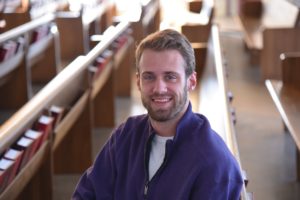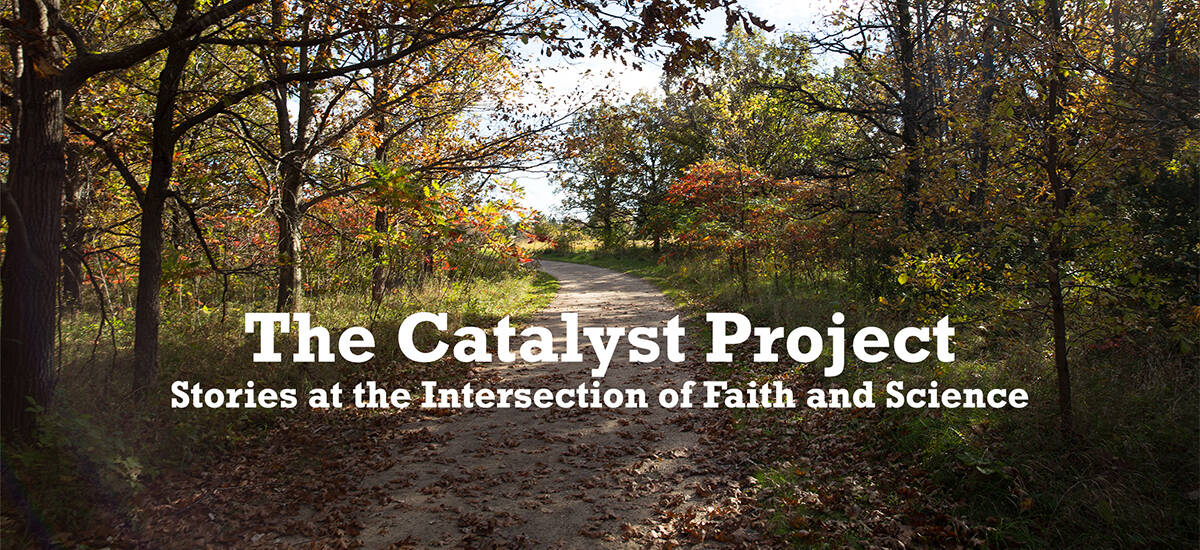
Ben Rorem became interested in math and science for many different reasons. His father was also a Physics major at Gustavus, and went on to become an emergency room physician. From his interactions with and proximity to his dad, Ben developed an interest in science and math. His affinity for these subjects was supported in school. Ben says that you can certainly be good at something and not enjoy it, but “in my case, I really enjoyed math and science because they came naturally to me”. Throughout high school, he took advanced classes in biology, chemistry, and physics. Ben has a very strong love and affinity for nature. He wants to “be able to combine my passion for science and nature” to develop alternative energy sources. After Gustavus, Ben hopes to earn his PhD in engineering or applied physics and use that to work with solar or wind technologies or develop new forms of renewable energy. He sees this career path as a way “that I can help the world become a little more green and help save nature”.
Ben’s talents and gifts help him both inside and outside the classroom. He is very organized and responsible, which helps him with his classes. It’s important to him that he’s “putting my best effort into what I’m learning”. Outside of the classroom, Ben says that one of his strengths is “caring for my friends and family”. He wants to always be there for them and to be willing to talk to them about anything. He also enjoys being someone who people feel comfortable going to to talk about anything, because “since I love to learn, I really enjoy hearing new perspectives and being able to broaden my views on various topics”. Ben thinks that one of his biggest strengths is “being able to communicate with people of all different backgrounds, and being able to find common ground with them”.
Two of the most influential people in Ben’s life are his parents. He describes his mom as “a very kind person, and she’s taught me very valuable social skills and has helped pass along that kindness to me”. Ben says his mom is fun, quirky, and really likes making sure other people are okay. He “really [respects] that and tries to live like she has”. His dad is both very intelligent and very kind, and Ben says that “he, like myself, is a nerd”. Ben’s dad likes to know lots of facts about everything, but if “you ask him something that he doesn’t know he’ll immediately go and try to figure it out”. Ben thinks that this curiosity and general love of learning are traits that his dad has passed along to him. Another hugely influential person in his life has been the Physics professor Steve Mellema, who is a family friend and was Ben’s father’s roommate in college. Dr. Mellema would come over to Ben’s house when he was young, and “he was always the person I wanted to show my new toy to”. He says that “I’d always be excited to see him, because he was so excited about my excitement”. After coming to Gustavus and having Dr. Mellema as a professor, Ben has “been able to experience more of that excitement and curiosity and that respect for everyone”, and appreciates getting to spend more time with him.
Ben was raised Lutheran, and says that “I believe in God and I believe in Jesus”. When he was growing up, he had to go to church with his parents and didn’t enjoy it. This changed when Ben went to a retreat where he “developed a passion for my faith” and gained an understanding of why his parents had been pushing him to attend church. Through these “Teens Encounter Christ” retreats, Ben was able to develop a belief system. He says that “I believe in showing understanding for people’s backgrounds, and knowing that people come from all sorts of different scenarios”. Additionally, Ben believes that “you need to be respectful and listen”. When it comes to science, he believes in “the creative process” and the models used by science. However, Ben also believes that there are areas that science cannot understand, and says “that’s where my faith comes in”.
In Ben’s experience, there are many physicists who “believe in a God of some sort”. He think that this might come from the fact that in physics, mathematical models are used to describe what can be observed. However, “a lot of times things just don’t go the way that we expect”. Additionally, Ben thinks that the level of complexity in the universe “encourages the thought of a higher being”. He thinks that faith might be less common in other scientific disciplines, and suggests that this could be due to “the type of questions that they study” or it could just be a coincidence. Overall, Ben believes that “physics lends itself well to a faith”.
Ben believes that science “is there to help us understand” the world, not to counter religious ideas. Because of this, he says that “any sort of religious view that I have that might come into direct conflict with science is just something that might have been interpreted wrong over history”. An example of this appearance of conflict is the story of creation. Ben says that in the Bible, creation took seven days, but according to physics there’s no way that could have happened. He makes sense of this by questioning how days might be defined and by treating Genesis as a narrative. Ben believes that when it comes to science and religion, “the way that animosity begins and fear begins is when you think one is out to get the other”. For him, “nothing really scares me as a Christian when it concerns science”.
There are some biblical teachings that concern Ben. To him, miracles “don’t really seem to make sense scientifically”. This worries him, because it raises the question of “what am I believing in if rationally things don’t make sense”. Ben makes sense of questions like this by thinking that “regardless of whether those miracles happened or not, you can still believe strongly in what those actions were meant to do”. He chooses to focus on the narratives of these stories, what kinds of morals were being conveyed, and what kinds of faith people were trying to build in others. Even though some events in the Bible might make him uncomfortable “because it breaks what we know as natural law”, Ben thinks that being able to look at these events in terms of morals and stories to believe in is valuable. He says that even if something in the text isn’t “real”, it can still have an important impact on you.
Like many people, Ben’s beliefs have changed over time. He says that when he started college, “I was a very strong Christian”. As time has gone on, “my proximity to people of other beliefs has given me a much broader view on religion”. The distinction between faith and religion is important to Ben, and he says that while “my faith has been strengthened over the years”, his religion has broadened. He has come to respect other religions very highly, not just because he has family friends who are Muslim, but because he now understands “that most religions are trying to teach very similar morals”. Ben has learned more about other people and historical events during his time in college, and this has caused him to “be a bit looser” about how he self-identifies as a religious person.
Ben’s vocation is informed by his faith. He says that, when it comes to his Physics major, he feels “like part of my calling is to discover things and fulfill my curiosity”. Ben’s love for nature informs his passion for and interest in renewable energy. Ben feels “strong spirituality” and God in nature, and he wants to show respect for this personal experience. Additionally, Ben says that the Genesis creation narrative, which talks about human stewardship of the world and “taking care of God’s nature”, resonates with him. He thinks that most people want to take care of at least some part of nature, and believes that this is where environmental protection movements come from. Ben’s faith and love for nature is his emotional basis for his vocation.
